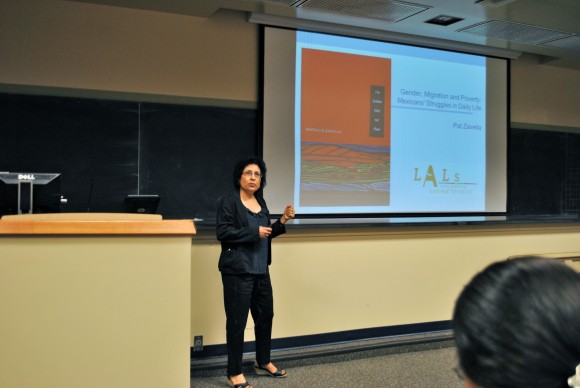Lecture from UC Santa Cruz professor kicks off year-long series on migration

University of California, Santa Cruz’s Prof. Patricia Zavella lectures in Mara Auditorium Wednesday on the topic of gender, migration and poverty. This lectures kicks of a yearlong series on the theme of migration (Photo by Tyler Leard).
By Tyler Leard, Contributing Writer
Lecturing to a full audience in Mara Auditorium, Professor Patricia Zavella began a year-long series of lectures on migration with her presentation on “Gender, Migration, and Poverty: Mexicans’ Struggle in Daily Life.”
The program was presented jointly by many of the academic departments on campus, including those of Women’s, Gender and Sexuality Studies, Anthropology, Latin-American Studies and the Center for Public Service
“We felt that migration would be a timely topic for this year because of the issues facing America, including diversification, the election, the growing population” said Women’s, Gender and Sexuality Studies professor, Nathalie Rambon, one of the organizers of the lecture series.
“I think a lecture like this can help Gettysburg students be more informed about the issues, and be able to see behind the stereotypes on immigration that are presented by the media and mainstream culture,” Zavella said.
Zavella, a professor at the University of California-Santa Cruz, described the research she conducted in her hometown of Santa Cruz, which has a large population of migrant farm workers, and discussed the diversity among illegal immigrants and within Mexico itself.
Building off of this, Zavella emphasized the most common points of entry from Mexico into the United States and the paths that the migrants follow once they reach America, moving up into California or through Texas to the Midwest and the Northeast.
Zavella proceeded to discuss the effects of immigration on the family dynamics and gender roles of migrant families. Zavella said that the former trend of men immigrating temporarily to find work then returning to Mexico has, due to stricter immigration laws, been gradually supplemented by entire families, either together or in stages, migrating to America.
Currently, 56 percent of authorized immigrants from Mexico are women. This new trend has caused heightened gender complications among migrant families, as women, once they come to America, begin to perform traditional male roles and assume a greater sense of independence.
This has posed challenges to male migrants, who often turn to hyper-masculinity and traditionalism to cope.
Finally, Zavella discussed the effect of American immigration policies on migrants, which she argued have forced migrants to cross in more dangerous areas and become more reliant on smugglers and drug dealers to help them cross into the country.
Once inside, American nativism and belligerence toward immigrants often makes them feel, according to Zavella, “as if they were neither here nor there.”
When asked how she would reform American immigration policy, Zavella offered several potential solutions. “First, I would try to restore the idea of a fluid border, which is what we’ve historically had between Mexico and the United States. Most of the immigrants, they love Mexico and they want to go back there, but the danger of crossing is too great.”
To further this idea, Zavella advocated greatly increasing the number of visas issued by the government, ending all fence building and giving due process and advice to detainees caught illegally crossing the border. “We are a nation of immigrants” Zavella said. “Almost all of us can claim to be descended from [immigrants]. If we can restore that openness of culture that has been there for so much of our history and try to understand rather than attack those who are trying to immigrate here today, it would be of great benefit for all of us.”
